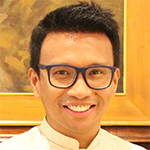 Last week, Leloy Claudio invited me to his show Basagan Ng Trip to talk about the relationship between religion and violence. The topic is very timely in light of the Marawi siege. Islam has regrettably become the convenient scapegoat for many people.
Last week, Leloy Claudio invited me to his show Basagan Ng Trip to talk about the relationship between religion and violence. The topic is very timely in light of the Marawi siege. Islam has regrettably become the convenient scapegoat for many people.
From the point of view of sociology, however, religion is at the heart of radicalization not because it is the cause of violence. Instead, religion gives individuals the divine worldview that helps them understand and act upon their situation.
If we looked closely, we'd realize that the situation of the radicalized, often the minority, is full of suffering and discrimination. The violent message of extremist preachers could work if it resonated with the listener's everyday hardships.
The point is that radicalization happens when individuals become convinced that violence in the name of their religion is justifiable. They engage in a cosmic war carried out in the here and now.
And the history of religious violence is not unique to Islam. Buddhism in Southeast Asia, Hinduism in South Asia, and Christianity in the West have all been used one way or another to justify violence.
Islamophobia
Leloy aptly ended the episode by arguing that it is a quick-fix solution to blame Islam for the violence in Marawi.
But in spite of our elaborate discussion – please check out the video – the comments insisted that we are wrong and that Islam is a violent religion. One even declared that "Islam is poisonous. The true followers of Islam are the members of ISIS." Another one dared me to "go to Marawi and declare myself to be Christian."
My quick response: I am a born-again Christian. I have gone there and even lectured at the Marawi campus of Mindanao State University. Some of my close friends are in fact Maranao. They are far more sincere than other people I know.
The folks who made the comments are not the usual faceless trolls who spread hate around. They are real individuals. What their angry comments thus tell us is that Islamophobia is as real as the violence waged in the name of Islam.
Evil, dangerous
There is a compelling assumption that fuels Islamophobia: Islam is an evil religion. Its permutations are endless.
It is convinced Muslims are out there to conquer the rest of the world. It is afraid that they are growing in number and occupying territories. It believes that they are going to forcibly convert everyone to their religion. It fears that all Muslims are capable of blowing themselves up in public.
In other words, Islamophobia indiscriminately assumes that all Muslims are by default dangerous.
To defend their views, Islamophobic folks directly quote the Qur'an. "Muhammad is the apostle of Allah. Those who follow Him are merciful to one another but harsh to the disbeliever."

Verses like this convince them that all Muslims are ready to kill at will.
Nothing could be further from the truth. The same Qur'an speaks of justice and mercy. These are virtues by which any typical Muslim would try to live .
In fact, there are so many verses that declare Allah to be "all-pardoning, ever-forgiving."
More worrisome is that Islamophobia conveniently overlooks the fact that Muslims themselves are the first victims of the Marawi siege. They are called evacuees.
How then do we respond?
In the final analysis, Islamophobia lives off the same reality that Islamic extremism does: uncompromising hatred.
What fuels both is ignorance. Both are ignorant that Islam as a religion has so much depth. Both are ignorant that there are many other peace-loving Muslims out there.
And yet the bigger danger of Islamophobia is that not many might realize that they perpetuate it. People, in other words, are bothered by terrorism but not by their ignorance of Islam. In this sense, terrorists have achieved their goal.
But all is not lost.
Swami Tyagananda, a Hindu monk, offers a nugget of wisdom. For him, it is "difficult to hate a religion when you personally know that warm, intelligent, and considerate people practice it."
In my view, interreligious understanding does not seek that we give up our own faith. It simply asks us to recognize that there are people from the other side of the fence whose goodwill emanates from their own religious convictions.
We can work with these people to build a better world in which hatred – not religion – becomes irrational.
It is to them we must muster all the courage and humility to say peace be with you – assalamualaikum. – Rappler.com
Jayeel Serrano Cornelio, PhD is the Director of the Development Studies Program, Ateneo de Manila University. The National Academy of Science and Technology has named him the 2017 Outstanding Young Scientist in the field of sociology. Share with him your thoughts on Twitter @jayeel_cornelio.